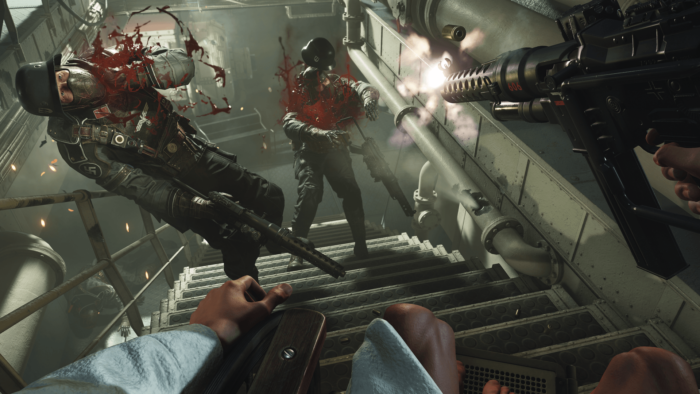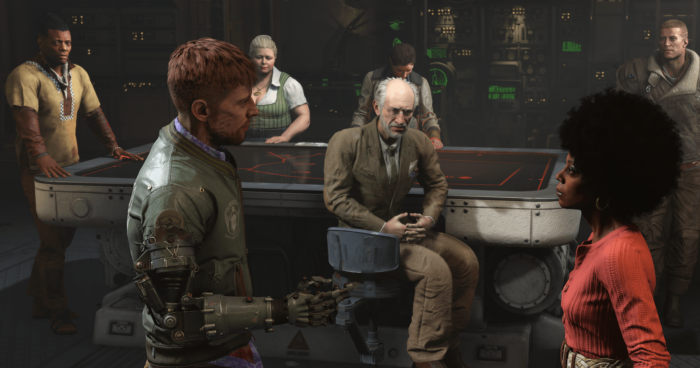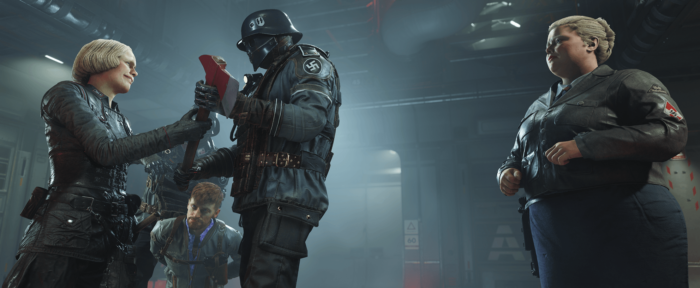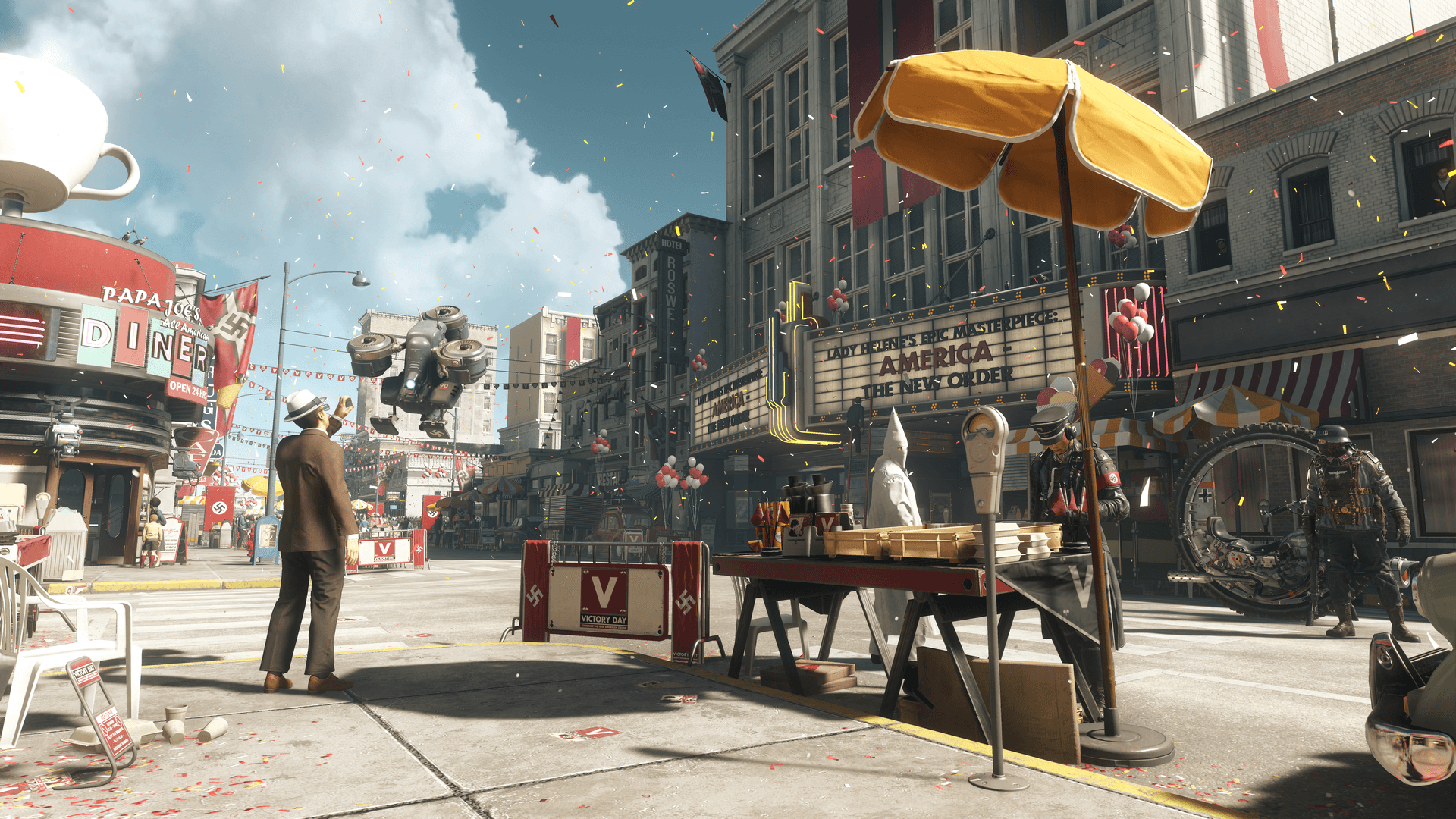Has Wolfenstein II gone too far with its politics?
It seems impossible to escape the political in this day and age: in everyday life, in sports and entertainment, and in art. As division becomes more palpable it’s easy to become fatigued, and many are calling for the de-politicisation of everyday life and the media. Such debates among video game fans has been re-ignited recently with the release of Wolfenstein II: New Colossus. It’s almost impossible to believe the level of relevance Wolfenstein II has in today’s political climate.
Developer Machine Games have openly said as much when discussing their sequel to their 2014 reboot of the old school first person shooter series. Wolfenstein II is set in a fictional world where the Nazis and Axis Powers did not lose World War II. We play as William ‘BJ’Blazkowicz and with him follow the resistance group The Kreisau Circle as they carry out attacks against their oppressors. Wolfenstein II sees BJ return home to a very different America to the one he left behind. Its E3 announcement earlier this year came with a trailer which juxtaposed images of idyllic 1960s American life with flags bearing swastikas and members of the KKK proudly walking down the street in broad-daylight.

Image Credit: Bethesda, Press Xtra
Almost no one could have predicted that these scenes would be sickeningly recreated only two months later in Charlottesville, Virginia. Participants involved in the Unite the Right rally bore Nazi and Confederate flags and chanted Nazi and white supremacist slogans. Violence quickly broke out among the protesters and counter-protesters, which tragically led to the death of Heather Heyer.
A simplistic view of Wolfenstein’s recent controversy sees those who supported the rally criticising Bethesda and Machine Games for their anti-Nazi game and ad campaign. While such comments and arguments exist, there are some made with slightly more nuance and arguing that the companies are pandering to certain political ideologies.
It has angered some of his supporters as they argue it perpetuates some connection between them and the far-right, a connection they claim has been fabricated
Advertisements for Wolfenstein II mimic statements made by those on the left and the opponents of Donald Trump, such as “Not my America”. Another slogan used – “Make America Nazi-Free Again” – is an obvious reference to President Donald Trump’s campaign slogan “Make America Great Again”.
It has angered some of his supporters as they argue it perpetuates some connection between them and the far-right, a connection they claim has been fabricated by those who disagree with their political stances, and in an attempt to shamelessly discredit them. But Bethesda’s Vice President of PR and Marketing Pete Hines has defended the decisions made and stances taken but his company.

Image Credit: Bethesda, Press Xtra
“Bethesda doesn’t develop games to make specific statements or incite political discussions. We make games that we think are fun, meaningful, and immersive for a mature audience. In Wolfenstein’s case, it’s pure coincidence that Nazis are marching in the streets of America this year. And it’s disturbing that the game can be considered a controversial political statement at all.”
All of this is reminiscent of discussion from earlier this year with the announcement of Far Cry 5, which came under fire from the same critics who claimed it was pandering to the left. Therefore, perhaps, potentially worsening pre-existing political fractures present in society, rather than helping to promote unity. Questions arose as to whether video games should potentially shy away from taking political stances so as to not alienate fans.
Grand Theft Auto V, a game filled with satire and social commentary about American life and governance, is exceptionally well-reviewed and the third best sold game ever
Reggie Fils-Amie, President of Nintendo of America, responded saying: “Making political statements are for other people to do. We want people to smile and have fun whenthey play our games.” This is, of course, very much in keeping with the all-inclusive family-friendly vibe the company try to project.
Nintendo have certainly shown that political statements are not essential to making quality games with two of their titles featuring prominently in 2017’s ‘Game of the Year’ discussion, Super Mario Odyssey and The Legend of Zelda: Breath of the Wild.

Image Credit: Bethesda, Press Xtra
That said, political and social comments don’t necessarily hinder a games success either. Grand Theft Auto V, a game filled with satire and social commentary about American life and governance, is exceptionally well-reviewed and the third best sold game ever, behind only Minecraft and Tetris.
The main reason for the inclusion or exclusion of certain themes will be sales. If profits fall, the industry will look to rectify this. If political statements are found to be too divisive and enough gamers choose not to buy a game because of their inclusion, developers and publishers will remove them from future titles.
I’d encourage engaging with varying perspectives, plenty of criticism exists for our predisposition to separate ourselves into echo chambers of only likeminded individuals
But otherwise games, much like paintings, film or any other art form have no duty to conform to the public’s demands or censor their work. Video games are their developer’s creation and should tell their story in the way they feel is best.
I’d encourage engaging with varying perspectives, plenty of criticism exists for our predisposition to separate ourselves into echo chambers of only like-minded individuals. Though if you don’t want to play a title because of its content, you don’t have to. You and it can exist comfortably together in the world. It should also be noted that Wolfenstein II is a heavily politicised game, in an industry which offers many non-political alternatives. Gamers everywhere – no matter their political bent – will always be able to find a game they enjoy.

Comments